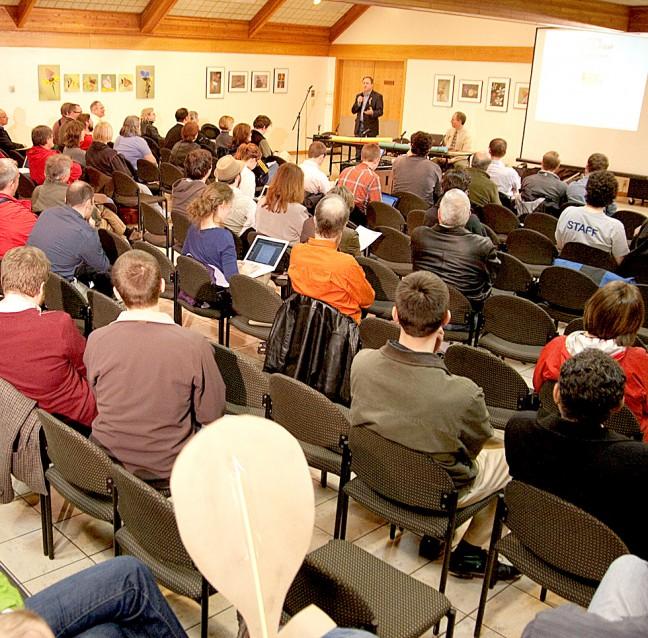Madison residents were invited to take part in the first public discussion regarding the city’s desire to host Google’s new high-speed fiber Internet Thursday evening.
The presentation, hosted at Olbrich Botanical Gardens, saw nearly 100 Madison residents come out to voice their support and submit their ideas to sway Google’s opinion in favor of Madison.
The technology, which has come to be known simply as Google Fiber, would provide one gigabit per second broadband Internet access to Madison residents, almost 100 times faster than what is currently offered.
At a cost of nearly $100 million for initial installation and implementation, an expense covered by Google, the service would be made available at a rate competitive with currently available Internet service providers.
A strong business case is required to convince Google that coming to Madison would be worthwhile, Mayor Dave Cieslewicz said. But business can only get Madison so far; that is where the creativity and cooperation of citizens comes in.
“If it’s just city officials blathering on like I am now, it’s not going to work, it has to be a grassroots thing,” Cieslewicz said. “Let’s go get Google.”
Ald. Mark Clear, District 19, who directed the event, said Google is interested in selecting a community that can not only prove itself creative enough, but can provide infrastructure for quick and efficient deployment of the technology.
Preston Austin of MediaLandscape Software presented some efforts being carried out to generate public involvement for the project. The website, Madfiber.net, offers information to individuals eager to learn more about the technology itself and provides a venue for supporters to post videos, pictures and messages.
He added Facebook, Twitter and numerous other social networking mediums have been employed to generate discussion and build awareness for the technology.
Supporters can also log onto Madfiber.net to fill out a survey expressing interest in the technology and nominate Madison directly to Google.
“We don’t have to behave like city officials,” Austin said. “That’s convenient.”
Clear noted the involvement of various organizations, from the University of Wisconsin Chancellor’s Office, Greater Madison Chamber of Commerce, Madison College (MATC) and the Madison Metropolitan School District.
Google’s Madison office, he added, had made it explicitly clear they could not be involved in the promotional aspects or application for the project. Regardless, there were ideas abound of how to best lure Google into the city.
Audience members generated ideas ranging from a mock subscription to the service to viral videos to mapping out the extensive conduit system already installed throughout much of the city. Perhaps one of the most impetuous ideas thrown into the ring was spray-painting the Google logo across one of Madison’s lakes.
Following the presentation, attendees were invited to partake in what has tentatively been named “Madfiber.net Ice Cream,” from UW’s own Babcock Hall. Containing colorful M&Ms to imitate Google’s colorful logo and granola symbolizing fiber, the ice cream was in short supply by the time the majority of the attendees had dispersed.
The Request For Information to Google is due March 26. Upon receiving all applications, Google will make their decision as to where to implement their technology.
Google, Kansas, the city formerly known as Topeka, drew criticism from Cieslewicz who portrayed the act as cheap.
Cieslewicz said naming first-borns and changing the names of cities would not help to sway Google’s opinion, it is instead only a simple publicity stunt.
“Nobody knows the names of cities in Kansas anyway,” he added.












